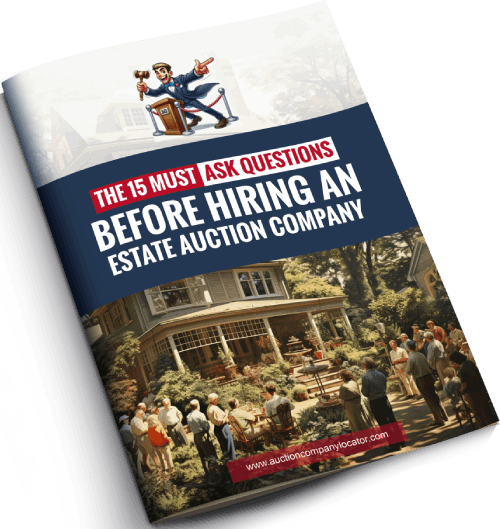
Welcome to our Business Liquidation Auction FAQ page, where we answer the most common questions we get about selling land at auction.
A business liquidation auction is the sale of all or most of a company’s assets through competitive bidding, often as a result of closing the business, bankruptcy, or restructuring.
Auctions are fast, transparent, and can often maximize the return on your assets by creating competition among buyers.
Any type of business can be liquidated via auction, including retail stores, restaurants, manufacturing companies, professional services, and more.
Assets can include machinery, equipment, inventory, furniture, fixtures, vehicles, intellectual property, and sometimes the business’s real estate.
The auction company will assess and catalog the assets, market the auction, register bidders, and conduct the auction, selling the assets to the highest bidders.
The entire process, from initial consultation to auction day and final payout, typically takes 30 to 90 days, depending on the size and complexity of the business.
An orderly liquidation is planned and conducted over time, while a forced liquidation is typically required due to bankruptcy or foreclosure and happens more quickly, often at reduced asset values.
Auction companies or professional appraisers assess the fair market value of the assets based on condition, demand, and industry benchmarks.
Auctions are marketed online, through email campaigns, industry-specific channels, social media, and direct outreach to potential buyers who may be interested in the specific assets.
Sellers typically pay a commission based on the total sales, and there may also be costs for asset appraisal, marketing, and the auctioneer’s services.

Ready to make an informed decision on your next auction? Download our essential “15 Must Ask Questions” guide for FREE! These quick guides arm you with the key questions to ask before hiring an estate, business liquidation, or land auction company. Simply enter your email to access expert tips that could save you time, money, and ensure you’re partnering with the best. Don’t leave your next auction to chance—download your guide now!
Yes, reserve prices can be set to ensure that key assets do not sell below a minimum acceptable value, though it’s important to balance this with the goal of liquidating quickly.
Unsold assets can be relisted in future auctions, sold privately, or liquidated through other channels depending on your preferences and the auctioneer’s recommendations.
Buyers can include business owners, industry competitors, equipment dealers, individual bidders, and investors looking for discounted assets.
Liquidating assets may have tax consequences such as capital gains or losses. It’s important to consult with a tax advisor to understand your obligations.
Yes, assets should be cleaned, organized, and ready for inspection. Any documentation related to warranties, titles, or maintenance history should be provided to the auction company.
The auction company will typically list detailed descriptions, photos, and sometimes inspection reports. Buyers may also have the opportunity to inspect assets in person or online.
Once the auction concludes and buyers have completed payment, sellers usually receive their portion of the proceeds within 7 to 30 days, depending on the terms agreed upon with the auction company.
Most auction companies require a non-refundable deposit to secure bids, reducing the likelihood of non-payment. If a buyer defaults, the item may be offered to the next highest bidder or relisted.
You can choose to liquidate part of the business’s assets if you’re downsizing or restructuring, or you can liquidate the entire business if it’s closing.
While auctions often maximize asset value, there is always the risk that some items may sell for less than expected or remain unsold. Partnering with an experienced auctioneer can help mitigate these risks.
Fill out the form below, and we will send your copy of:
“15 Must Ask Questions Guide” for your auction type.